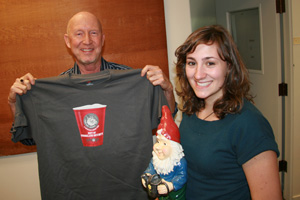Campus News
Revamping the party at UCSC
It’s fall quarter and — for some UCSC students — it’s a time of year that is synonymous with partying. Staying out late and drinking are often the things to do. But many students don’t see the down sides to overdoing it.

It’s fall quarter and — for some UCSC students — it’s a time of year that is synonymous with partying.
After a long summer break, returning and first-time college students are feeling euphoric and quite naturally ready to socialize. Staying out late and drinking are often the things to do. But many students don’t see the down sides to overdoing it.
Last fall, according to a survey published by the Pacific Research Center, 48 percent of UCSC students reported personal problems as a result of drinking, including memory loss, sickness, and missing class — which can obviously lead to lower grades. Over-indulging in drinking can lead to a host of other quite serious problems, including alcohol poisoning and increased susceptibility to sexual assault.
Excessive drinking can also have legal consequences. Within the first 5 weeks of school, Santa Cruz and UCSC police issued 41 citations with accompanying fines, made 2 arrests, and handed out 19 official warnings at off-campus student parties.
City and campus police increase their enforcement during fall quarter as part of back-to-school campus and community effort to educate students about the impacts of consuming too much alcohol. Did you know that you could be held liable if someone drives away from your party drunk and gets into an accident? If you are fined, will your guests help you pay for the ticket? I’ve heard from some friends that their fines have been up to $312.
Even my neighbors’ off-campus house has been “red flagged.” You should know that the “Loud & Unruly Party” ordinance, found under the Santa Cruz Municipal Code 9.37, sets the fine for a first violation at $250; a second violation doubles the fine; a third violation at the same address in a 12 month period will cost you $1,000! I don’t know if you can or want to blow a grand on a ticket, but I can think of a much better way to spend that money.
Earlier this fall I attended community block parties in Santa Cruz that were designed to bring students and Santa Cruz residents together. I was joined by students volunteering as part of the campus’s Good Neighbor Initiative.
The conversations my fellow students and I had with city residents led us to believe that some students living off campus may not realize the profound effect that large and out of control parties can have on both students’ and residents’ lives. At one gathering, I spoke to a woman who told me about intoxicated students urinating on her lawn at 2 a.m. and shouting profanity.
To some students, especially those who are drunk, this may seem hilarious. But to a mother with an 8-year-old child who is exposed to that, it is no joke. I encountered a lot of residents who faced a difficult decision: reporting underage drinking and noise violations or trying to build a working relationship with the students. They are, after all, still neighbors.
I would like to offer a few ways to reduce risks associated with hosting parties that may cause community disruption — and in the process, stay on the good side of your neighbors and the police. Pick up the current “Just Say Gnome” brochure, available from the SHOP (Student Health Outreach and Prevention) Office in UCSC’s Student Health Center. You will find advice on how to host safer parties, including where to find out about noise ordinances, communicating with your neighbors before your party, recognizing the signs of alcohol poisoning, and understanding your liability if you serve to minors. Here are a few other tips: keep party-goers inside the house, and post taxi numbers for intoxicated guests who don’t have a designated driver. Remember that you could be held liable for the actions of your guests if they leave your party drunk, so you might want to cut anyone off who is getting out of control.
Partying safer is smarter. It will help you maintain better physical and mental health, and help keep your judicial record clear — something important to think about when applying for jobs and grad schools. It will also save you money on fines and damages that you could get stuck with if a drunken person punches a hole through your wall. And partying safer will make you a better neighbor.
In the SHOP Office, where I volunteer, we hear the stories of students who have experienced assault or abuse at the hands of a friend when they were intoxicated. Or who have fought with police officers or housemates. These first-hand accounts have opened my eyes to the negative — but easily avoidable — aspects of partying. So, as we say in the office, “just say gnome and party small!
Anya Hunter is a third-year UCSC literature major. She works at SHOP [Student Health Outreach and Prevention] as part of UCSC’s Chancellor’s Undergraduate Internship Program.